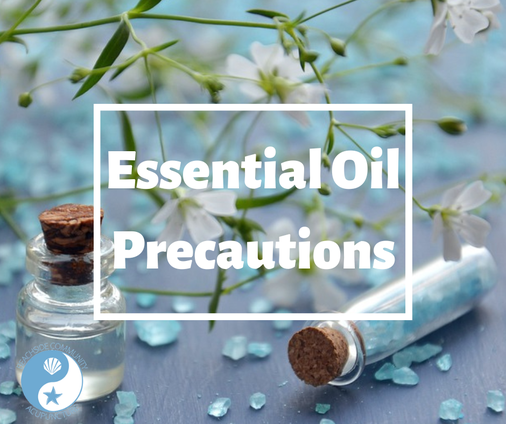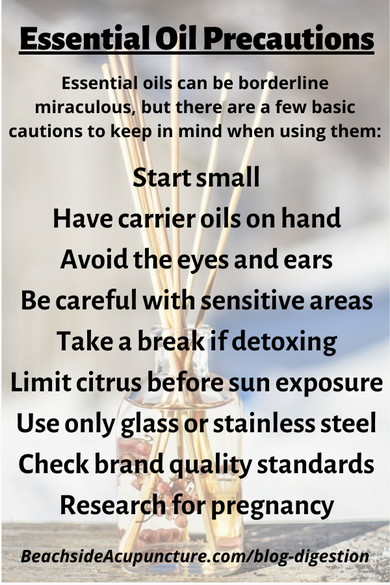
This post contains affiliate links, meaning Beachside Community Acupuncture PLLC may receive a small commission for purchases made through certain links at no additional cost to you. (In other words, you support us in a small way when you buy the products that we highly recommend and would use ourselves!) Click here to view our full disclosure policy.
Essential oils are like little miracles in a bottle: They're more potent and easier to store than dried herbs, don't expire, and benefit every body system. They do not have side effects like medications and are very safe when used properly. Along these lines, though, there are a few basic precautions to take when incorporating essential oils into your health routine...
Dilution
Essential oils are very strong - Peppermint oil, for instance, is said to be equal to 27 cups of peppermint tea - so always start small when beginning to use them. Some aromatherapists also believe in never applying an oil neat, meaning it should always be mixed with a carrier oil like coconut oil or jojoba oil instead. Others, however, think it's safe to do, but recommend keeping a carrier oil on hand in case an oil is too strong.
We suggest that you do your own research and see which school of thought resonates with you. Diluting an essential oil with a carrier oil is definitely an excellent idea when you want to spread the oil over a large surface - e.g. across your back - or if you're working with an oil that is known to be "hot," like Oregano or the blend Thieves. Gentle essential oils like Lavender may not need to be diluted, unless you're applying it to a sensitive area.
Placement
Essential oils can be used almost anywhere on the body, but never drop them into your eyes or ears. If you want to work on either of these sense organs, dilute the oil and apply it on the orbit of the eye or on the outer ear respectively, keeping in mind that certain essential oils may still sting.
Also, be careful with sensitive areas, such as the genitals or anywhere with thinner skin. Research proper dilution and keep extra carrier oil on hand in case you feel any discomfort. When in doubt, opt to apply the oil to reflexology points on the feet instead, as the feet have very tough skin that will likely not be irritated.
Reactions
As with anything else in holistic health, listen to your body! If an essential oil seems to bother your skin, dilute it even more or try applying it to your feet instead. If you have any kind of physical detoxification symptoms, either use less of the oil while your body catches up its elimination processes or dilute it further.
Essential oils can also have a big impact on emotional health. Journal, meditate, talk to a counselor, etc. if stuck emotions get released so that you can fully process and clear them. If the experience feels too overwhelming, take a short break from the oils until you feel ready to dive in again. Traditional Chinese Medicine (TCM) believes that unresolved emotions are the biggest cause of internal disharmony, so although the release does not feel good to go through, you'll likely feel much, much better after it.
Photosensitivity
Have you ever seen someone use lemon juice to lighten his or her hair? If you have, it will be of no surprise that citrus oils like Lemon can have the same effect. Avoid using citrus oils topically 24 hours before you intend to be in the sun because they will increase your skin photosensitivity, making it more likely to burn. (If you want to give yourself natural highlights, though, feel free to apply them to your hair!)
Safe Ingestion
Ingesting essential oils is controversial in the aromatherapy world, but we believe that they are safe to consume if you know that they are very, very pure. (See the next section.) That being said, definitely start very small when adding them to foods, beverages, and capsules for both safety and taste reasons. If you accidentally drop more than you intended into a dish or drink, try to dilute it with more ingredients or liquid.
Essential oils are natural detoxifiers, which is great for our bodies but not great for synthetic substances. Never use plastic or Styrofoam cups or containers with recipes involving essential oils, as the oils will eat away at them! (If you want to do a fun experiment, drop a bit of Lemon oil on an old piece of Styrofoam and watch it dissolve.) Glass and stainless steel don't react in this way, and they are better for overall health and the environment anyway.
Finally, oil and water don't mix, so if you're adding an essential oil to a beverage like tea or lemonade, mix in a bit of honey or salt as well to give the oil something to stick to. By doing this, the oil will disperse through the drink instead of hanging out at the top of it.
Brand Research
Unfortunately essential oils have become a fad, which means plenty of companies jumped to produce their own oils when they saw that they were trending. Essential oils are not well-regulated, and essential oils marketed as organic can still contain additives like preservatives and synthetic fragrances. Because of this, it is very, very important to research each essential oil brand to make sure that they are committed to high quality standards. The brand should do extensive testing to prove that the oils contain the therapeutic compounds that provide the oil's health benefits; otherwise you may just be buying something that smells nice.
We only stock Young Living at our clinic because they run at least 15 tests at least three times on every batch of oil, but if you have another company that you trust and love, then of course use their products. Just read their safety guidelines and follow their recommendations in case they differ from those set by Young Living.
Pregnancy
Pregnancy can be overwhelming, especially when it comes to choosing what is safe for both mother and baby. Searching for oils to avoid during pregnancy will give a lot of conflicting information, but it's worth sorting through it all to be confident your decision of whether or not to use them. You'll probably come across something like this (taken from the Quick Reference Guide for Essential Oils):
- Do not use Basil, Birch, Calamus, Cassia, Cinnamon, Hyssop, Tansy, Lavandin, Rosemary, Sage, or Tarragon.
- Use caution with Angelica, Cedarwood, German Chamomile, Cistus, Citronella, Clary Sage, Clove, Cumin, Cypress, Davana, Fennel. Laurel, Marjoram, Mountain Savory, Myrrh, Nutmeg, Peppermint, Rose, Spearmint, Vetiver, and Yarrow.
Some sources say not to ingest oils at all or use them topically at all. Plenty of testimonials also say that any oil is fine as long as you're using it in a safe and cautious way. At the end of the day, it's up to you to pursue due diligence and decide what you're comfortable with.


Kathleen Ketola is a Licensed Acupuncturist and the owner of Beachside Community Acupuncture. She loves providing affordable acupuncture to the residents of McKinney, Texas, and surrounding cities like Prosper, Frisco, and Plano, but she also enjoys educating the general public on how acupuncture and Traditional Chinese Medicine (TCM) can treat everything from pain to infertility to stress and beyond. Click "Book Now" at the top of this page to book an appointment or feel free to contact her at (214) 417-2260.








